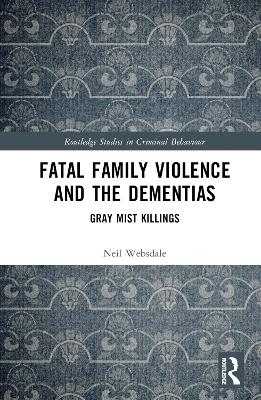
Fatal Family Violence and the Dementias
Routledge (Verlag)
978-1-032-36807-8 (ISBN)
Killings by people with dementia raise questions about the role of biological, psychological, and sociological forces. This book therefore encourages discussions around the relative weighting of these interrelated forces, and why the criminal justice system and the courts have a hard time handling these killings. It also adds to our understanding of the social responses to people with dementia, the orchestration of services, the nature of caring, and the interaction between sufferers and those familial, community, and state actors that provide support and care. The vividly detailed case studies (from the US, UK and Australia) uniquely inform criminological debates about violence, homicide, and the social responses to these complex phenomena. They are organized around the apparent motives for the killing, such as mercy, theft, prior intimate partner violence, mental illness, and exhaustion. The social responses of families, communities, and state actors are examined and contextualized against what researchers and dementia specialists suggest are promising or best practices for intervention. Apparent triggers or circumstantial precipitants for the killings invite discussion of signals, risks, and preventive interventions. The book culminates in an attempt to make sense of gray mist killings, as well as a discussion of broader implications and significance in relation to globalization, violence against women, the rising prevalence of the dementias, declining birthrates, climate change, and sustainable economic development.
Drawing from a variety of disciplines, this book will be of great interest to students and scholars of criminology, sociology, psychology, psychiatry, anthropology, gender studies, social work, law, public policy, and gerontology. It should also appeal to judges, prosecutors, lawyers, social workers, gerontologists, law enforcement, adult protective services, physicians, psychologists, and psychiatrists.
The Open Access version of this book, available at http://www.taylorfrancis.com, has been made available under a Creative Commons Attribution-Non Commercial-No Derivatives (CC-BY-NC-ND) 4.0 license.
Neil Websdale is Director of the Family Violence Center at Arizona State University and Director of the National Domestic Violence Fatality Review Initiative (NDVFRI). He has published work on domestic violence, the history of crime, policing, social change, and public policy. His books include: Rural Woman Battering and the Justice System: An Ethnography (1998), which won the Academy of Criminal Justice Sciences Outstanding Book Award in 1999; Understanding Domestic Homicide (1999); Making Trouble: Cultural Constructions of Crime, Deviance, and Control (co-edited with Jeff Ferrell, 1999); Policing the Poor: From Slave Plantation to Public Housing (2001), winner of the Academy of Criminal Justice Sciences Outstanding Book Award in 2002 and the Gustavus-Myers Center for the Study of Bigotry and Human Rights Award in 2002; Familicidal Hearts: The Emotional Styles of 211 Killers (2010). Professor Websdale’s social policy work involves helping to establish networks of domestic violence fatality review teams across the United States and elsewhere. His extensive fatality review work has contributed to the NDVFRI receiving the prestigious 2015 Mary Byron Foundation Celebrating Solutions Award. He has also worked on issues related to community policing, full faith and credit, and risk assessment and management in domestic violence cases. Professor Websdale trained as a sociologist at the University of London, England and currently lives and works in Flagstaff, Arizona.
Part 1
Chapter 1: Gray Mist Killings
Chapter 2: Dementing Illness: A Brief Introduction
Part 2
Chapter 3: Dementing Illness and Abnormalities of Mind
Chapter 4: Mercy and Exhaustion
Chapter 5: Prior Intimate Partner Violence and Abuse
Chapter 6: Thieves and Fraudsters
Part 3
Chapter 7: Problematic Contemporary Responses
Chapter 8: The Fiction of Prediction: Risk and Danger
Part 4
Chapter 9: Making Sense of Gray Mist Killings
Chapter 10: Global Implications
| Erscheinungsdatum | 07.03.2024 |
|---|---|
| Reihe/Serie | Routledge Studies in Criminal Behaviour |
| Zusatzinfo | 7 Tables, black and white |
| Verlagsort | London |
| Sprache | englisch |
| Maße | 156 x 234 mm |
| Gewicht | 625 g |
| Themenwelt | Geisteswissenschaften ► Psychologie ► Allgemeine Psychologie |
| Geisteswissenschaften ► Psychologie ► Entwicklungspsychologie | |
| Geisteswissenschaften ► Psychologie ► Sozialpsychologie | |
| Recht / Steuern ► Strafrecht ► Kriminologie | |
| Sozialwissenschaften ► Soziologie | |
| ISBN-10 | 1-032-36807-1 / 1032368071 |
| ISBN-13 | 978-1-032-36807-8 / 9781032368078 |
| Zustand | Neuware |
| Informationen gemäß Produktsicherheitsverordnung (GPSR) | |
| Haben Sie eine Frage zum Produkt? |
aus dem Bereich


